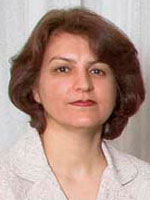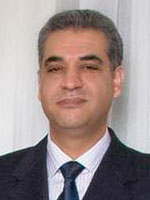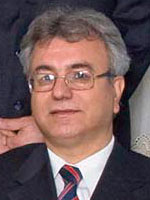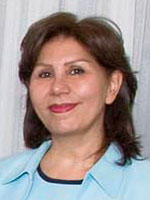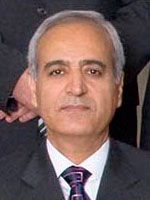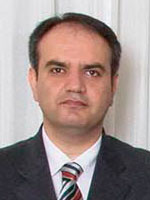BIOGRAFIE PRZETRZYMYWANYCH BAHAITÓW
Wpisał: Agnieszka Szopińska
Mrs. Fariba Kamalabadi – arrested 14 May 2008 at her home in Tehran
Fariba Kamalabadi, 46, a developmental psychologist and mother of three, was denied the chance to study at a public university as a youth because of her Baha’i belief. Because of her volunteer work for the Baha’i community, she was arrested twice in recent years and held for periods of one and two months respectively before her arrest and imprisonment last May.
Mrs. Kamalbadi was born in Tehran on 12 September 1962. An excellent student, she graduated from high school with honors but was nevertheless barred from attending university. Instead, in her mid-30s, she embarked on an eight-year period of informal study and ultimately received an advanced degree in developmental psychology from the Baha’i Institute of Higher Education, an alternative institution established by the Baha’i community of Iran to provide higher education for its young people.
Mrs. Kamalabadi married fellow Baha’i Ruhollah Taefi in 1982. They have three children. Varqa Taefi, about 24, received a doctoral degree in political science and international relations in the United Kingdom and is currently continuing his research in China. Alhan Taefi, 23, has studied psychology at ABSI. Taraneh Taefi, 14, is a junior high school student in Tehran.
Mrs. Kamalabadi’s experience with persecution extends beyond her immediate situation. Her father was fired from his job as physician in the government health service in the 1980s because he was a Baha’i, and he was later imprisoned and tortured.
Mr. Jamaloddin Khanjani – arrested 14 May 2008 at his home in Tehran
Jamaloddin Khanjani, 75, is a once-successful factory owner who lost his business after the 1979 Islamic revolution because of his belief in the Baha’i Faith – and who then spent most of the 1980s on the run under the threat of death from Iranian authorities.
Born 27 July 1933 in the city of Sangsar, Mr. Khanjani grew up on a dairy farm in Semnan province and never obtained more than a high school education. Yet his dynamic personality soon led to a successful career in industrial production – and as a Baha’i leader.
In his professional career, he has worked as an employee of the Pepsi Cola Company in Iran, where he was a purchasing supervisor. He later left Pepsi Cola and started a charcoal production business. Later he established a brick-making factory, which was the first automated such factory in Iran, ultimately employing several hundred people.
In the early 1980s, he was forced to shut down that factory and abandon it, putting most of his employees out of work, because of the persecution he faced as a Baha’i. The factory was later confiscated by the government.
In his career of voluntary service to his religious community, Mr. Khanjani was at various points a member of the local spiritual assembly of Isfahan, a regional level Auxiliary Board member, and, in the early 1980s, a member of the so-called “third” National Spiritual Assembly of the Baha’is of Iran – a group that in 1984 saw four of its nine members executed by the government.
After that, Mr. Khanjani was able to establish a mechanized farm on properties owned by his family. Nevertheless, authorities placed many restrictions on him, making it difficult to do business. These restrictions extended to his children and relatives, and included refusing loans, closing their places of business, limiting their business dealings, and banning travel outside the country.
Mr. Khanjani married Ms. Ashraf Sobhani in the mid-1950s. They have four children. Farida Khanjani, 51, is a chiropractor working in China. Maria Khanjani, about 49, an artist who is married with two children and residing in Tehran. Mr. Alaeddin Khanjani, about 48, an optometrist residing in Tehran, who is married with two children. And Mrs. Emilia Khanjani, about 45, who is married with two children and resides in Tehran.
Mr. Khanjani was arrested and imprisoned at least three times before his current incarceration. After years on the run, he was arrested and imprisoned for two months in the late 1980s. During this period of detention, he was intensely questioned. During those interrogations, however, he was able to make considerable headway in convincing authorizes of the non-threatening nature of the Baha’i Faith and he, along with many others, were subsequently released.
Mr. Afif Naemi – arrested 14 May 2008 at his home in Tehran
Afif Naemi, 47, is an industrialist who was unable to pursue his dream of becoming a doctor because as a Baha’i he was denied access to a university education. Instead, he diverted his attention to business, one of the few avenues of work open to Baha’is, taking over his father-in-law’s blanket and textile factory.
He was born on 6 September 1961 in Yazd. His father died when he was three and he was raised in part by his uncles. While still in elementary school, he was sent to live with relatives in Jordan and, although he started with no knowledge of Arabic, he soon rose to the top of his class.
He has long been active in volunteer Baha’i service. He has taught Baha’i children’s classes, conducted classes for adults, taught at the BIHE, and been a member of the Auxiliary Board, an appointed position which serves principally to inspire, encourage, and promote learning among Baha’is.
He married Ms. Shohreh Khallokhi in the early 1980s. They have two sons, Fareed Naimi, 27, who is married and a graduate of the ABSI, and Sina Naimi, 22, who has studied music.
Mr. Saeid Rezaie – arrested 14 May 2008 at his home in Tehran
Saeid Rezaie, 51, is an agricultural engineer who has run a successful farming equipment business in Fars Province for more than 20 years. He is also known for his extensive scholarship on Baha’i topics, and is the author of several books.
Born in Abadan on 27 September 1957, Mr. Rezaie spent his childhood in Shiraz, where he completed high school with distinction. He then obtained a degree in agricultural engineering from Pahlavi University in Shiraz, attending with the help of a scholarship funded from outside the country.
In 1981, he married Ms. Shaheen Rowhanian. They have three children, two daughters and a son. Martha, 24, is studying library science. Ma’man, 21, is studying architecture. Payvand, 12, is in his second year of middle school.
Mr. Rezaie has actively served the Baha’i community since he was a young man. He taught Baha’i children’s classes for many years, and served the Baha’i Education and Baha’i Life Institutes. He was also a member of the National Education Institute.
He is a scholar and an author, and he has served as an academic adviser to Baha’i students.
During the early 1980s, when persecution of Baha’is was particularly intense and widespread, Mr. Rezaie moved to northern Iran and worked as a farming manager for a time. Later he moved to Kerman and worked as a carpenter and at other odd jobs in part because of the difficulties Baha’is faced in finding formal employment or operating businesses.
In 1985, he opened an agricultural equipment company with a Baha’i friend in Fars Province. That company prospered and won wide respect among farmers in the region.
He has experienced various forms of persecution for his Baha’i belief, including an arrest and detention in 2006 that led to 40 days in solitary confinement.
His two daughters were among 54 Baha’i youth who were arrested in Shiraz in May 2006 while engaged in a humanitarian project aimed at helping underprivileged young people. They were later released but three of their colleagues were sentenced to four years in prison on false charges and are currently incarcerated in Shiraz.
Mrs. Mahvash Sabet – arrested in Mashhad on 5 March 2008
Mahvash Sabet, 55, is a teacher and school principal who was dismissed from public education for being a Baha’i. For the last 15 years, she has been director of the Baha’i Institute for Higher Education, which provides alternative higher education for Baha’i youth. She also served as secretary to the Friends.
Born Mahvash Shahriyari on 4 February 1953 in Ardestan, Mrs. Sabet moved to Tehran when she was in the fifth grade. In university, she studied psychology, obtaining a bachelor’s degree.
She began her professional career as a teacher and also worked as a principal at several schools. In her professional role, she also collaborated with the National Literacy Committee of Iran. After the Islamic revolution, however, like thousands of other Iranian Baha’i educators, she was fired from her job and blocked from working in public education.
It was after this that she became director of the BIHE, where she also has taught psychology and management.
She married Siyvash Sabet on 21 May 1973. They have a son, Foroud Sabet, 33, and a daughter, Negar Sabet, 24, both born in Hamadan.
While all of the other Friends were arrested at their homes in Tehran on 14 May 2008, Mrs. Sabet was arrested in Mashhad on 5 March 2008. Although she resides in Tehran, she had been summoned to Mashhad by the Ministry of Intelligence, ostensibly on the grounds that she was required to answer questions related to the burial of an individual in the Baha’i cemetery in that city.
Mr. Behrouz Tavakkoli – arrested 14 May 2008 at his home in Tehran
Behrouz Tavakkoli, 57, is a former social worker who lost his government job in the early 1980s because of his Baha’i belief. Prior to his current imprisonment, he has also experienced intermittent detainment and harassment and, three years ago, he was jailed for four months without charge, spending most of the time in solitary confinement.
Born 1 June 1951 in Mashhad, Mr.Tavakkoli studied psychology in university and then completed two years of service in the army, where he was a lieutenant. He later took additional training and then specialized in the care of the physically and mentally handicapped, working in a government position until his firing in 1981 or 1982.
Mr. Tavakkoli married Ms. Tahereh Fakhri Tuski at the age of 23. They have two sons, Naeim and Nabil. Naeim, 31, currently lives in Canada with his wife where he works as a civil engineer. Nabil, 24, is currently studying architecture at the Baha’i Institute for Higher Education
Mr. Tavakkoli was elected to the local Baha’i governing council in Mashhad in the late 1960s or early 1970s while a student at the university there, and he later served on another local Baha’i council in Sari before such institutions were banned in the early 1980s. He also served on various youth committees, and, later, during the early 1980s he was appointed to the Auxiliary Board. He was appointed to the Friends group in the late 1980s.
To support himself and his family after he was fired from his government position, Mr. Tavakkoli established a small millwork carpentry shop in the city of Gonbad. There he also established a series of classes in Baha’i studies for adults and young people.
He has been periodically detained by the authorities. Among the worst of these incidents was three years ago when he was held incommunicado for 10 days by intelligence agents, along with fellow Friends’ member Fariba Kamalabadi. He was then held for four months and during that confinement developed serious kidney and orthotic problems.
Mr. Vahid Tizfahm – arrested 14 May 2008 at his home in Tehran
Vahid Tizfahm, 35, is an optometrist and owner of an optical shop in Tabriz, where he lived until early 2008, when he moved to Tehran.
He was born 16 May 1973 in the city of Urumiyyih. He spent his childhood and youth there and, after receiving his high school diploma in mathematics, he went to Tabriz at the age of 18 to study to become an optician. He later also studied sociology at the Advanced Baha’i Studies Institute (ABSI).
At the age of 23, Mr. Tizfahm married Furuzandeh Nikumanesh. They have a son, Samim, who is now nine years old and in the fourth grade.
Since his youth, Mr. Tizfahm has served the Baha’i community in a variety of capacities. At one time he was a member of the Baha’i National Youth Committee. Later, he was appointed to the Auxiliary Board, an advisory group that serves to uplift and inspire Baha’i communities at the regional level. He has also taught local Baha’i children’s classes. He was appointed to the Friends in 2006.
Dokumenty potwierdzające, że prześladowania bahaitów
są dobrze zorganizowane i zaplanowane
Dokumenty te zostały odkryte i upublicznione przez niezależne organizacje.
• 1993 – ujawnione w raporcie ONZ przez Specjalnego Sprawozdawcę ONZ Reynaldo Galindo Pohl tzw. memorandum Golpayganiego z 1991 roku.
Memorandum przygotowane przez Najwyższą Radę Rewolucyjną i ostemplowane ‘tajne’, przygotowane dla lidera Islamskiej Republiki Iranu, Ayyatollah Ali Akbara Hashemi Rafsanjaniego. Memorandum zostało podpisane przez Sekretarza Rady Hujjatu`l Islam Seyyeda Mohammada Golpayganiego i zatwierdzone przez Ayatollaha Khamenei, który dodał swój podpis do dokumentu.
Wzywa do takiego traktowania bahaitów, aby ich rozwój został zablokowany, co jest dowodem na to, że kampania przeciw bahaitom jest kierowana przez rząd. Dokument pokazuje, że celem rządu jest to, aby bahaici zostali analfabetami i osobami niewykształconymi (wydalenie z uniwersytetów), żyjącymi tylko na poziomie ekonomicznego przetrwania (zamykanie ich firm, zwalnianie z pracy), obawiających się w każdym momencie, że nawet najmniejsze naruszenie prawa zakończy się uwięzieniem lub czymś znacznie poważniejszym.
Jego ogólna wymowa to: stworzenie atmosfery dla planowej i cichej eksterminacji bahaitów – największej nie-islamskiej mniejszości religijnej w Iranie.
Tekst tłumaczenia memorandum na końcu dokumentu oraz na stronie:
http://question.bahai.org/
• 20 marca 2006r. – tajny list z 29 października 2005 roku, który zaniepokoił Specjalnego Sprawozdawcę ONZ ds. Wolności Religii i Przekonań – panią Asmę Jahangir.
List wysłany 29 października 2005 roku przez Przewodniczącego Głównej Siedziby Zarządzania Siłami Zbrojnymi w Iranie do: Ministerstwa Informacji, Straży
Rewolucyjnej, policji wzywa do:
– identyfikowania wyznawców wiary baha`i
– monitorowania działań pojedynczych wyznawców
– zbierania każdej najmniejszej i wszystkich informacji dotyczących wyznawców wiary bahá`i
Specjalny Sprawozdawca jest zaniepokojony monitorowaniem działalności pojedynczych osób jedynie z powodu tego, że wyznają religię inną od religii państwowej.
• 24 sierpnia 2006r. Amnesty International upublicznia list irańskiego dowództwa sił zbrojnych nakazujący dowództwom różnych państwowych służb wywiadowczych, oddziałom policji oraz Straży Rewolucyjnej identyfikowanie’ i ‘monitorowanie’ bahaitów
List, noszący datę 29 października 2006r. i podpisany przez Przewodniczącego Dowództwa Sił Zbrojnych Iranu, przykuł uwagę opinii publicznej w marcu 2006 roku, kiedy jego istnienie ujawniła Specjalny Komisarz ds. Praw Człowieka w ONZ – pani Asma Jahangir.
Pani Jahangir, która poinformowała w marcu, że zawartość listu ‘wysoce [ją] zaniepokoiła’, nie ujawniła wtedy jego treści. Jednakże 24 lipca br. Amnesty International ogłosiła, że jest w posiadaniu tego listu i że poda do publicznej wiadomości jego treść.
Pełny tekst w języku angielskim jak również faksymile oryginalnego listu w języku perskim można zobaczyć pod adresem:
info.bahai.org/pdf/CommanderArmedForces1005_eng.pdf Tekst listu z 29 października 2005r. w języku angielskim
info.bahai.org/pdf/CommanderArmedForces1005_pers.pdf Tekst listu z 29 października 2005r. w języku perskim
Eksperci zajmujący się prawami człowieka zauważyli, że lista adresatów – która również zawiera paramilitarne Siły Partyzanckie Basij – nadaje szczególnie złowieszczy ton listowi, gdyż wskazuje na kontynuację polityki rządu Iranu, która systematycznie dąży do zniszczenia wspólnoty bahaickiej, a tym samym pozbawienia jej zdolności funkcjonowania.
Więcej informacji na temat irańskiej polityki skierowanej przeciwko bahaitom znajduje się na stronie question.bahai.org/002.php
Wprowadzenie w życie rozkazów rządu irańskiego jest już widoczne na poziomie lokalnym. Bahaicka Wspólnota Międzynarodowa jest w posiadaniu kopii listu z 2 maja 2006r. skierowanego do Irańskiego Związku Wytwórców Baterii zlecającego dostarczenie Związkowi Przemysłów, Produkcji oraz Technicznych Służb prowincji Kermanshah listy członków ‘sekty bahaickiej’.
Pełny tekst listu z 2 maja 2006r. w języku angielskim jak również faksymile listu oryginalnego w języku perskim można przeczytać na stronie:
info.bahai.org/pdf/battery_eng.pdf Tekst listu z 2 maja 2006r. w języku angielskim
info.bahai.org/pdf/battery_pers.pdf Tekst listu z 2 maja 2006r. w języku perskim
• 2 lipca 2006 roku – Miloon Kothari, Specjalny Sprawozdawca ONZ ds. odpowiednich warunków mieszkalnych w raporcie ONZ zaprezentowanym na konferencji prasowej napisał o „znieważającym wykorzystaniu praktyki konfiskowania mienia’.
Przynajmniej 640 bahaickich nieruchomości zostało skonfiskowanych od 1980 roku, według pana Miloona Kothari – Specjalnego Sprawozdawcy ONZ ds. odpowiednich warunków mieszkalnych, który napisał raport i zaprezentował go mediom 29 czerwca 2006 roku.
„Wymienione nieruchomości obejmowały domy i ziemię uprawną, ale również bahaickie święte miejsca, takie jak cmentarze i świątynie” – powiedział pan Kothari – „Właścicielom przypuszczalnie nie dano możliwości otrzymania wcześniejszej informacji związanej z procedurami konfiskaty lub uczestniczenia w samym akcie konfiskaty.”
Na przykład – przyznał pan Kothari – wiele konfiskat zostało dokonanych przez Irańskie Sądy Rewolucyjne, a wiele z werdyktów, które badał, stanowiły, że „konfiskata nieruchomości „oszczerczej sekty Baha`i [była] prawnie i religijnie usprawiedliwiona”.
Na terenach wiejskich, jak stwierdził, takim konfiskatom często towarzyszyły przypadki gróźb i fizycznej przemocy zarówno przed jak i podczas wymuszonych eksmisji.
Pan Kothari powiedział, że jest „zaniepokojony jasnym dowodem dyskryminującego postępowania wobec bahaickiego mienia, w tym nieruchomości.”
Podczas konferencji prasowej pan Kothari powiedział, że wciąż otrzymuje raporty o bahaitach, których ziemia została skonfiskowana.
„W ostatnich dwóch latach nastąpiło zwiększenie aresztowań bahaickich czołowych postaci, aresztowanych bez żadnych zarzutów i uwolnionych za bardzo wysoką kaucją” – powiedział pan Kothari (źródło: Voice of America) – „ i jedynym sposobem wpłacenia kaucji jest pozostawienie swojej własności w zastaw. Wygląda na to, że jest to następna metoda konfiskaty mienia.”
Raport roczny, który został napisany jako część 6-letniej kadencji dotyczącej polityki mieszkalnej na całym świecie w świetle prawa do odpowiedniego standardu życia, w tym roku został poświęcony przypadkom dyskryminacji sytuacji mieszkalnej zaobserwowanych przez pana Kothariego podczas podróży do Iranu i Kambodży w 2005 roku.
The secret memorandum on the Bahá’í Question
[Translation from Persian]
[Text in square brackets added by translator]
In the Name of God!
The Islamic Republic of Iran
The Supreme Revolutionary Cultural Council
Number: 1327/….
Date: 6/12/69 [25 February 1991]
Enclosure: None
CONFIDENTIAL
Dr. Seyyed Mohammad Golpaygani
Head of the Office of the Esteemed leader [Khamenei]
Greetings!
After greetings, with reference to the letter #1/783 dated 10/10/69
[31 December 1990], concerning the instructions of the Esteemed leader
which had been conveyed to the Respected President regarding the Bahá’í
question, we inform you that, since the respected President and the Head of
the Supreme Revolutionary Cultural Council had referred this question to this Council for consideration
and study, it was placed on the Council’s agenda of session #128 on 16/11/69 [5 February 1991] and session
#119 of 2/11/69 [22 January 1991]. In addition to the above, and further to the [results of the] discussions held
in this regard in session #112 of 2/5/66 [24 July 1987] presided over by the Esteemed leader (head and member
of the Supreme Council), the recent views and directives given by the Esteemed leader regarding the
Bahá’í question were conveyed to the Supreme Council. In consideration of the contents of the Constitution
of the Islamic Republic of Iran, as well as the religious and civil laws and general policies of the country,
these matters were carefully studied and decisions pronounced.
In arriving at the decisions and proposing reasonable ways to counter the above question, due consideration
was given to the wishes of the Esteemed leadership of the Islamic Republic of Iran [Khamenei], namely,
that “in this regard a specifi c policy should be devised in such a way that everyone will understand what
should or should not be done.” Consequently, the following proposals and recommendations resulted from
these discussions.
Th e respected President of the Islamic Republic of Iran, as well as the Head of the Supreme Revolutionary
Cultural Council, while approving these recommendations, instructed us to convey them to the Esteemed
leader [Khamenei] so that appropriate action may be taken according to his guidance.
SUMMARY OF THE RESULTS OF THE DISCUSSIONS AND RECOMMENDATION
A. General status of the Bahá’ís within the country’s system
1. They will not be expelled from the country without reason.
2. They will not be arrested, imprisoned, or penalized without reason.
3. The government’s dealings with them must be in such a way that their progress and development are
blocked.
B. Educational and cultural status
1. They can be enrolled in schools provided they have not identified themselves as Bahá’ís.
2. Preferably, they should be enrolled in schools which have a strong and imposing religious ideology.
3. They must be expelled from universities, either in the admission process or during the course of their
studies, once it becomes known that they are Bahá’ís.
4. Their political (espionage) activities must be dealt with according to appropriate government laws and
policies, and their religious and propaganda activities should be answered by giving them religious and
cultural responses, as well as propaganda.
5. Propaganda institutions (such as the Islamic Propaganda Organization) must establish an independent
section to counter the propaganda and religious activities of the Bahá’ís.
6. A plan must be devised to confront and destroy their cultural roots outside the country.
C. Legal and social status
1. Permit them a modest livelihood as is available to the general population.
2. To the extent that it does not encourage them to be Bahá’ís, it is permissible to provide them the
means for ordinary living in accordance with the general rights given to every Iranian citizen, such as
ration booklets, passports, burial certificates, work permits, etc.
3. Deny them employment if they identify themselves as Bahá’ís.
4. Deny them any position of influence, such as in the educational sector, etc.
Wishing you divine confirmations,
Secretary of the Supreme Revolutionary Cultural Council
Dr. Seyyed Mohammad Golpaygani
[Signature]
[Note in the handwriting of Mr. Khamenei]
In the Name of God!
The decision of the Supreme Revolutionary Cultural Council seems sufficient.
I thank you gentlemen for your attention and efforts.
